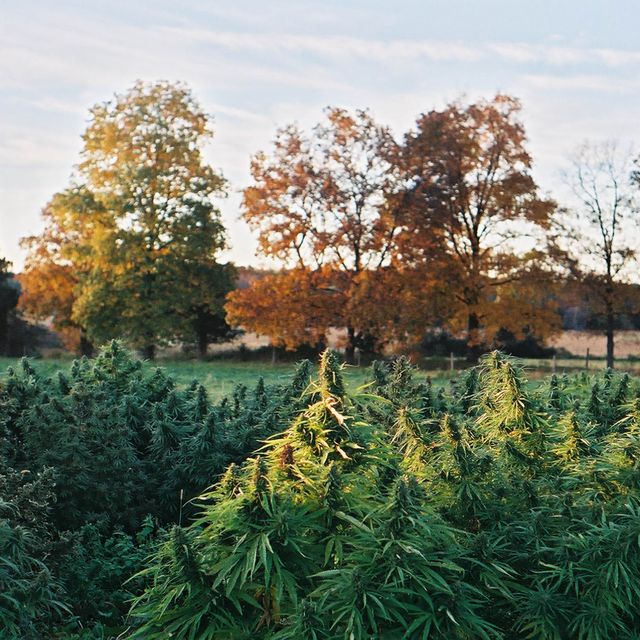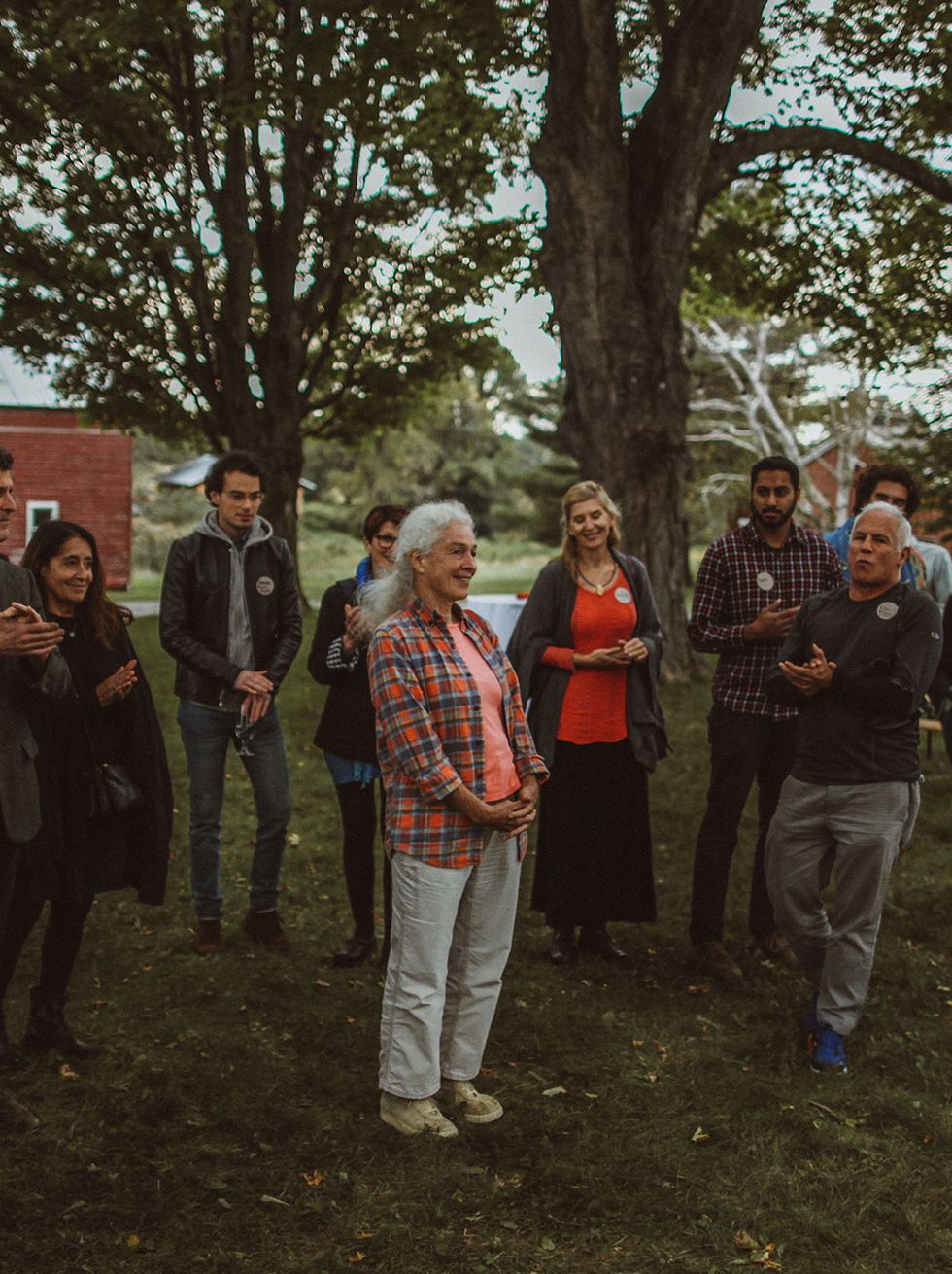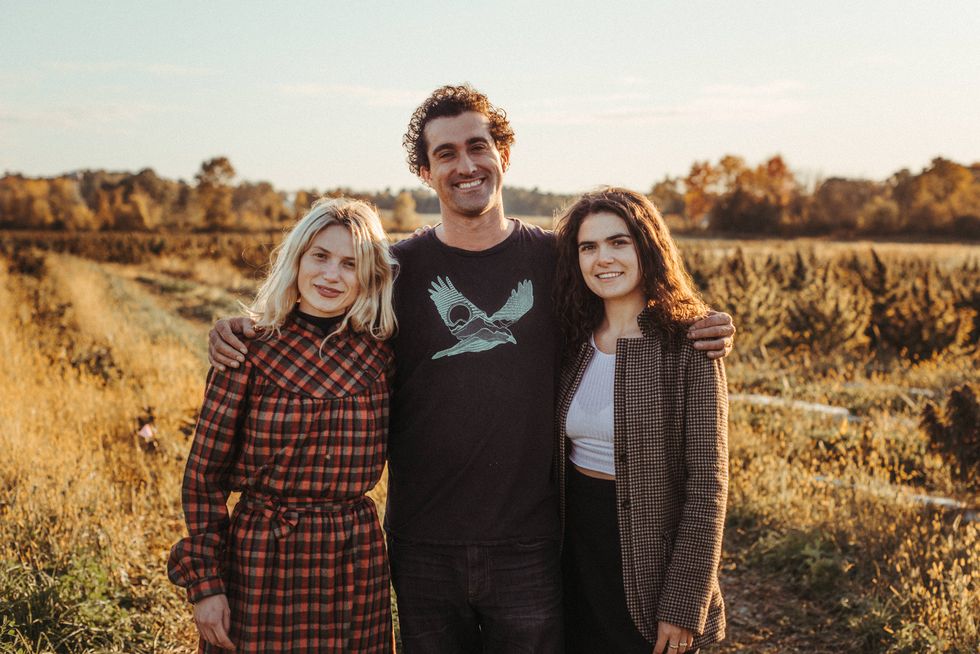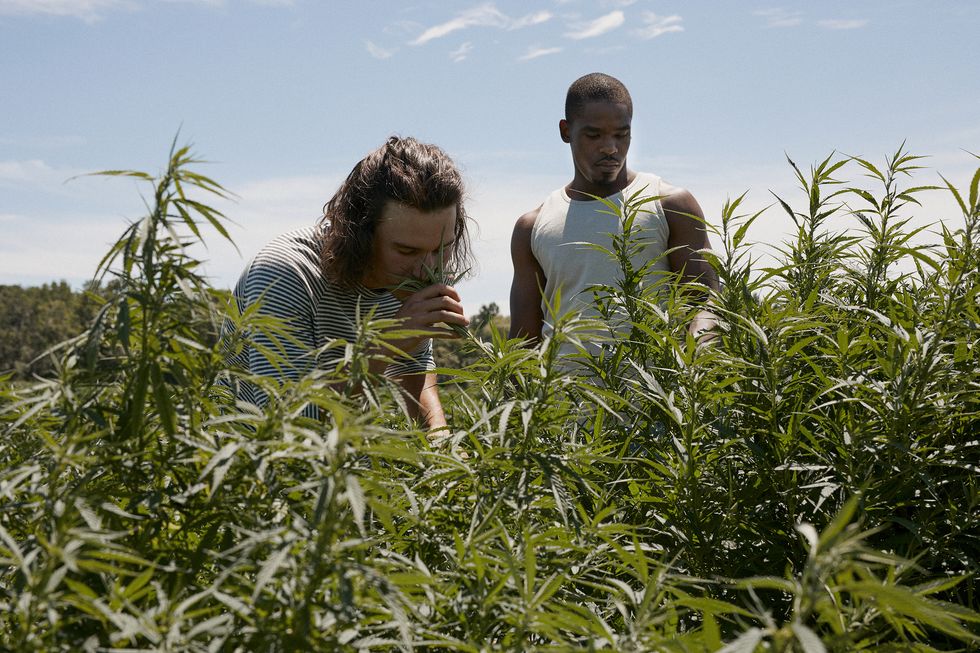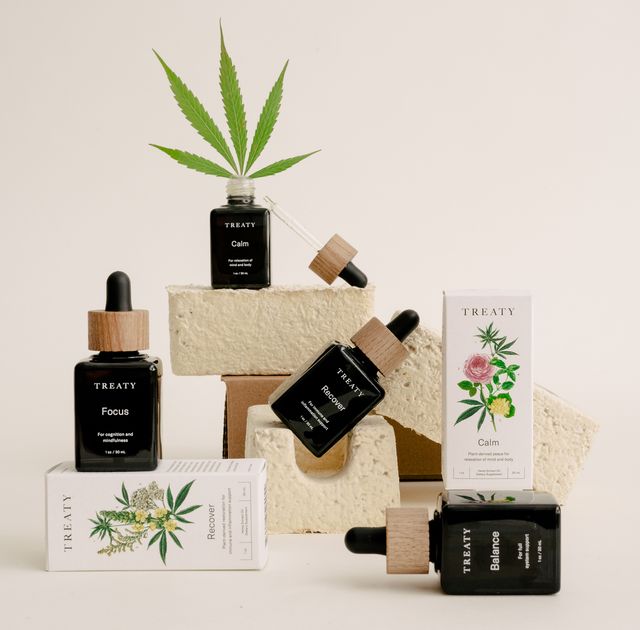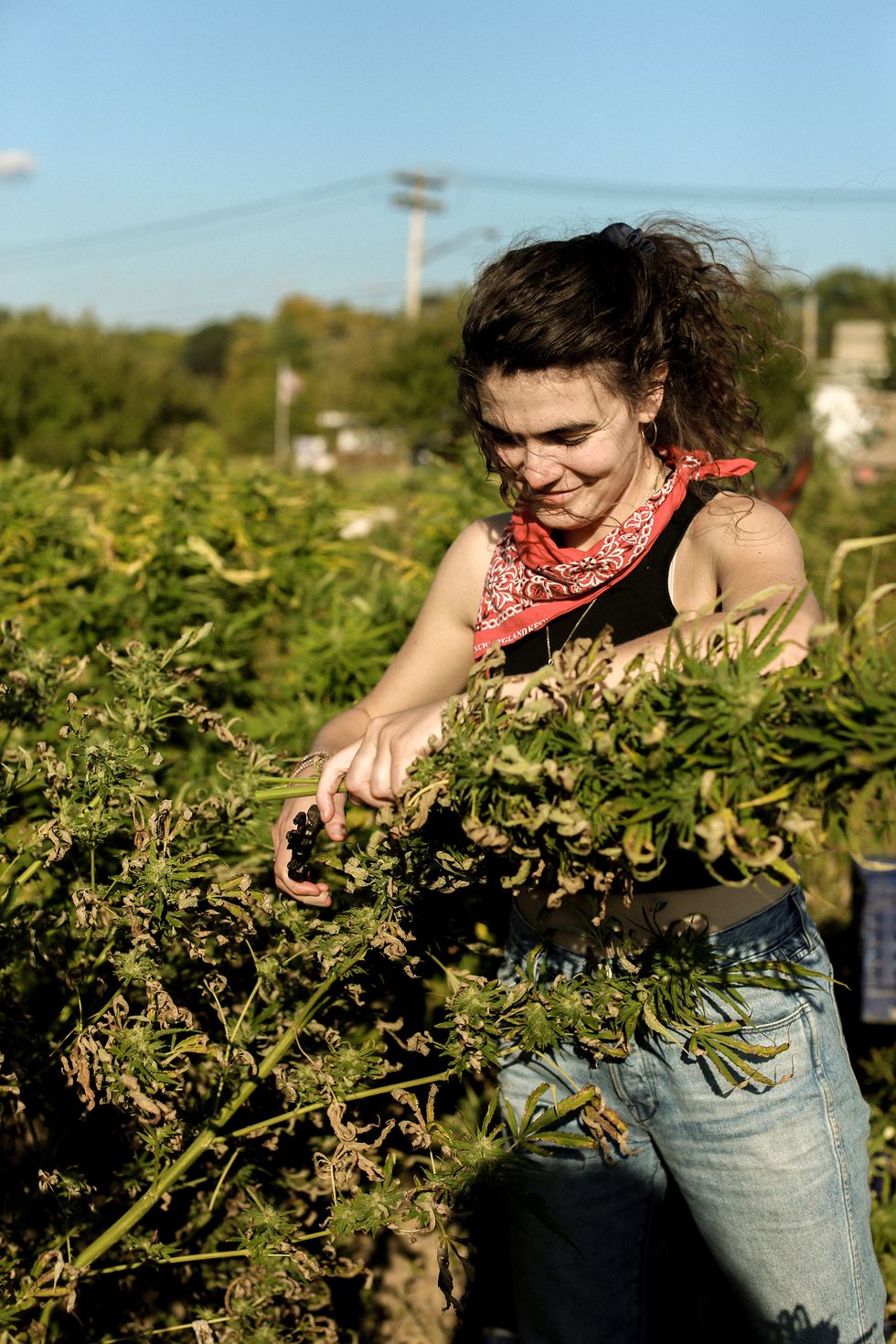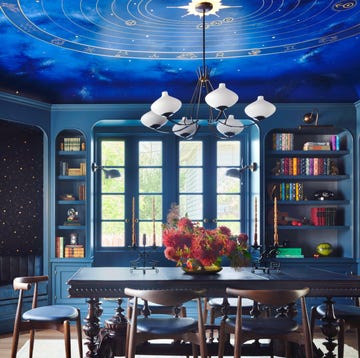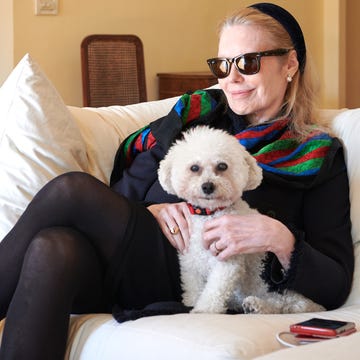It all started in 2013, at the end of a dirt track in a rural section of New York’s Hudson Valley where a humble white farmhouse stands among a few colonial-red barns. Old Mud Creek Farm, as it’s called, had been put up for sale by the agrochemical giant Syngenta, which had used the 386-acre property for years to test products—fertilizers, pesticides, herbicides—on corn and soy crops. Nothing remarkable, just another tract of heavily used industrial farmland in a region where people have been rushing to get out of the industrial farming business.
Who would buy such a place?
Abby Rockefeller, the septuagenarian daughter of the late David and Peggy Rockefeller, sent her farm manager, thirtysomething Ben Dobson, to negotiate a price. She and Dobson are now co-founders of Hudson Carbon and Hudson Hemp, two startups with a joint mission to: research and promote regenerative organic agriculture and carbon sequestration; farm hemp; perform complex botanical extractions; and, along the way, make and sell an exquisite line of CBD-infused wellness products called Treaty. Old Mud Creek’s “depleted, dead” soil, as they call it, was exactly what the two were after.
The farm is located in the town of Livingston, a two-hour drive north of New York City, and it borders a much larger property, Stone House Farm, which Rockefeller and her siblings inherited from their parents and still oversee today through a foundation. Rockefeller had long had her eye on the smaller place. “A beautiful piece of land,” she told me during a Zoom call this spring. “It’s called Old Mud Creek not because the water is muddy but because the bottom is muddy.” She had wondered if there might be a way to transition the land from conventional to organic farming and simultaneously gather scientifically useful data on chemical and carbon changes in the soil. It sounded straightforward, but she would soon learn it had never been done before, not in the detail she imagined.
She and Dobson met through her son Christopher Lindstrom, who attended Bard College at Simon’s Rock with Dobson two decades ago. “ ‘You have to get Ben!’ ” Rockefeller recalled her son telling her when she began to hatch her newest environmental initiative. Rockefeller has bright eyes and wavy gray hair that falls past her shoulders. “He practically yelled, ‘Ben Dobson is an amazing farmer!’ ” Dobson is an amazing farmer. He can grow anything anywhere—a fact that does not come as a surprise to anyone who knows his background. His parents are Anne Banks and Ted Dobson, early pioneers and stars of the organic food movement. He was born and raised on a farm right down the road, in Hillsdale, and he has worked in organic agriculture, in one form or another, pretty much his whole life.
Rockefeller bought Old Mud Creek Farm, and in 2016 Hudson Carbon began a partnership with Woods Hole Marine Biological Laboratory. A team of scientists from the Massachusetts-based research institute descended on the farm to set up observation equipment. The question they hope to answer at the end of the experiment: Can regenerative agriculture positively affect climate change and, executed at scale, even contribute to its reversal?
“We’ll have Hemp Kush. Electra. Lifter. CBG White. Cherry Wine. And…we love our Sour Space Candy!” Dobson was shouting to be heard above the growl of his truck as it bounced along a dirt road during a recent visit to Old Mud Creek Farm. He wanted to show me the fields and tell me the names of the hemp varietals he planned to plant in contour-based patterns. “It’s indica crossed with sativa!” he said of one variety’s unique attributes. Stretching out a long arm, he pointed to a section of field where he will rotate hemp with “wildflowers mixed with perennial grasses and legumes,” crops he says are “vital to the land and to our business.”
As executive director of Hudson Carbon and CEO of Hudson Hemp, Dobson oversees day-to-day operations, but he is in constant contact with Rockefeller. “She and I both feel the need to rescale agriculture and how people think about the environment,” he said. “That means moving from industrialized farming—with its focus on the use of synthetic fertilizers and chemical pesticides—back to smaller family-run farms growing food for their communities.” The parallel goal of promoting regenerative agriculture, he says, is creating richer farmland and conditions whereby more CO2 is converted into soil carbon than is released into the atmosphere.
It was Dobson who suggested planting hemp, Rockefeller said on our Zoom call. He explained that it’s considered a bioremediating plant, which means that as it grows—vigorously and with very large root systems—it cleans heavy metals from the soil and brings carbon back into the soil. In 2017 Dobson secured the 10th permit ever issued in the state of New York to grow hemp and promptly planted 10 acres of it. In 2018 he and Rockefeller tripled that amount, stepped up research on its beneficial properties, and went deep into development of the Treaty CBD brand and products. They also ordered processing equipment from California and Germany and built a state-of-the-art facility in one of their barns to extract CBD (and soon, perhaps, THC).
“The hemp has been diverse and exciting,” Rockefeller said. “A good crop for so many things. I didn’t know about its potential as a building material.” Rockefeller has been supporting and launching environmental initiatives for most of her adult life, and she said she likes to try new things. She was an early advocate in the fight against water pollution caused by sewage being dumped into the nation’s water supply. A 2005 article in the Chicago Tribune noted, “Abby Rockefeller, a descendant of John D., was the first American to install a composting system in her home in Cambridge, Mass. By 1973, she had founded Clivus Multrum, which remains the largest distributor of composting toilets for public use in North America.” That company is still going strong 50 years later, even though, Rockefeller said, “I was not at all a talented promoter of it.”
Marketing has not been an issue with this latest venture. “We’ve really enjoyed using excitement around the hemp,” Dobson told me with a smile. “It gets people’s attention.” During their first planting season, passersby—including a local sheriff—would pull over and get out of their cars to stare at the fields of plants, which look a lot like ones people used to try desperately to hide from public view. “By bringing it to the farm with the carbon project, we’ve had this beautiful opportunity to display how it fit together as part of a new vision for regenerative agriculture.”
Industrial hemp and psychoactive marijuana come from subvarieties of the cannabis plant. They look similar, but according to federal law, hemp must have less than 0.3 percent THC (the substance that produces pot’s high). Selling or growing either was long illegal in the United States, but in 2018 Congress passed a farm bill that made it legal in all 50 states to cultivate hemp and in many states to produce CBD, a non-psychoactive chemical compound that can be extracted from the plant (some states, including New York, had already enacted similar laws). The new legislation sparked an agricultural boom, with most growers focusing on producing crops to make CBD. In less than three years it has become a major industry. In the United States alone, CBD-infused products—from lotions and tinctures to drinks and edibles—generated $14.9 billion in 2020, according to New Frontier Data, an industry research firm. By 2025 it predicts that number will grow to $26.4 billion.
As for hemp’s “hot” cousin, 48 states now allow some form of medical and/or adult use. Earlier this year New York state passed the Marijuana Regulation and Taxation Act, which legalized its production and distribution (using the drug was decriminalized in 2019).
Up to this point, Dobson and Rockefeller have concentrated on cultivating hemp, which they sell in bulk, along with extracted CBD. They also use wildflowers and botanicals they grow, along with the hemp, to make the Treaty line of wellness products, which they sell through the brand’s website and to retail stores across the country. This part of the business is overseen by Dobson’s younger sisters, Melany and Freya. The farm’s growing practices and regeneration of living soil, they told me during a recent visit, make their offerings different from the thousands of other CBD products that have been introduced by brands, big and small, in recent years. “The health of the earth translates to the health of the individual in a very literal way,” Melany said.
They enlisted a top psychopharmacology researcher with the International Cannabis and Cannabinoids Institute to help create four ingestible CBD formulations, called Balance, Calm, Focus, and Recover. They concentrated on the origin of ingredients (native to the Hudson Valley) and the precision of the formulas (many “infused” products don’t provide information about how much CBD is in them; Treaty lists it to the milliliter).
“The hemp market has been through a green rush and a crash,” Ian Laird, co-founder of Hemp Benchmarks, a company that provides industry data for cannabis markets, told me recently. “I would guess 90 percent of the farmers have lost money.” Rockefeller and Dobson consulted with Laird when they started out, and he remains familiar with their business model. “Hudson Hemp is something different, more akin to craft production.” He says their focus on regenerative agriculture and carbon sequestration could serve them well if they decide to expand their offerings. “Hudson Hemp is really well positioned to be a source of high-quality, certified organic cannabis.”
Although he and Rockefeller have not formalized a plan, Dobson told me, they do see Treaty becoming both a CBD and THC cannabis brand. “It will have to be differentiated from mainstream, corporate companies, and focus on so much more than just THC.” Wind was whipping across the fields as we spoke, but Dobson was determined to show me the location for the new greenhouse frame and compost pile. “The future is about pairing cannabinoids with medicinal plants, herbs, and wildflowers—on farms just like this.”
Hudson Hemp will throw open its barn doors this August 14 and September 25 and welcome the public for a tour of the hemp fields and demonstration of how cannabis can be incorporated in a regenerative organic farming systems. Following the tour, guests will be invited to sample cold pressed hemp juice, hemp tea, hemp pesto, and heritage grain sourdough bread. See Hudson Hemp for details.
Lisa Gabor is a New York City–based writer and editor.
A version of this story appears in the Summer 2021 issue of Town & Country.
SUBSCRIBE NOW
